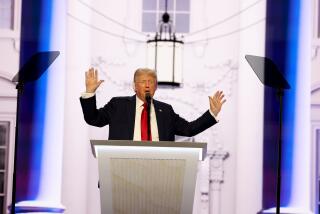NEWS ANALYSIS : If the West Is Puzzled, It’s Because Hussein Meant Speech for Others : Diplomacy: What the Iraqi leader’s enemies saw as a ‘no-surrender’ message was, to Arab ears, much more of a lengthy justification for peace.
- Share via
AMMAN, Jordan — He began with an appeal and ended with a curse. But when Iraqi President Saddam Hussein had completed what may have been the most critical speech of his 12 years in power, the enigmatic ruler had left most of the world wondering what it was he really said.
In the words of several veteran analysts of Iraq, it was “vintage Saddam,” classic rhetoric from a shrewd tactician who always tries to send several messages at once--messages that the analysts believe are clues to Hussein’s strategy and position no matter what eventually results from Thursday’s visit to Moscow by Iraqi Foreign Minister Tarik Aziz.
The first signals from Moscow were positive. Early today, after Aziz met for more than two hours at the Kremlin with Soviet President Mikhail S. Gorbachev, a Kremlin spokesman said that Iraq had responded positively to a Soviet peace initiative and that this could lead to an Iraqi withdrawal from Kuwait and an end to the Persian Gulf War.
But in Washington, the White House voiced “serious concern” about the Soviet-Iraqi plan and said it will consult with its Persian Gulf allies before responding further. Meantime, the presidential press secretary, Marlin Fitzwater, said the allied forces in the Gulf will “continue to prosecute the war.”
According to analysts here, the main reason so few observers in the world beyond Iraq’s borders understood the messages contained in Hussein’s speech was the fact that the speech was not meant for them in the first place.
“This speech was not directed at the United States or the international coalition,” one veteran Arab analyst in Amman said. “He sent his message to them through Tarik Aziz. This message clearly was directed to Saddam Hussein’s own troops and to his Arab supporters. It was meant as an explanation of why Aziz is in Moscow in the first place.”
And while Hussein’s enemies interpreted the address as a “no-surrender” speech that was, in effect, a “suicide note” to his troops, Arab analysts who have studied the Iraqi leader for years said his address was much more a lengthy justification for peace and capitulation than it was an angry justification for war.
“He has fast been moving toward withdrawal and settlement, without any explanation to his commanders or troops,” the veteran analyst here said. “This speech is that explanation--but with an appeal to them to stay ready, so they won’t relax if the peace effort fails.
“He’s preparing everybody in Iraq and the Arab world to accept the fact that he is now standing either on the edge of peace or the brink of a debacle.”
Analysts said Thursday’s speech used the softest, most subdued rhetoric of any of Hussein’s nationwide addresses since the crisis began Aug. 2. He used the word withdrawal for the first time in relation to Kuwait--a signal of his willingness to finally pull out of the occupied emirate. And despite his angry criticisms of President Bush, the general tone of the speech indicated that Hussein had accepted the key points of the Soviet peace plan but anticipated that the plan will be rejected in Washington, they said.
“This was Saddam Hussein in the dark, gray suit of a diplomat, not the beret and uniform of a commander at war,” a veteran Jordanian analyst said.
Hussein himself defined his audience as he began what Baghdad Radio had billed as “a very important speech to the people and the military forces.”
“Our great people,” the Iraqi leader began, “our courageous military forces, our Arab brothers and those all over the world who love humanity and reject aggression. . . .”
What followed was largely a history lesson: the world since Aug. 2, according to Hussein. Not until the middle of his address did Hussein begin what the analysts said was a clear illustration of the Iraqi leader’s mastery of manipulative diplomacy.
It came during the Iraqi ruler’s explanation of a new-found willingness to pull out of Kuwait, a land he had insisted for six months “is and always will be a part of Iraq.” Keenly aware that he was using the word withdraw for the first time, Hussein used it not just once but half a dozen times, and, through that discourse, revealed another trademark of his brand of diplomacy, an attempt to mimic the logic Bush used in rejecting Iraq’s peace initiative last Friday as a proposal too full of conditions.
“Earlier, before we made our initiative, they (the allies) used to say, ‘What we want is for the Iraqis to say that they will withdraw’--just merely mention the words we will withdraw ,” Hussein said in his 45-minute speech. “But now they’re talking about stripping Iraq of its power and capability, stripping Iraq of all its characteristics, moral characteristics and faith.
“Look how those who are calling for our withdrawal with one face are not saying now what they said earlier. Every now and then, they bring something new.”
Continuing to take off on Washington’s reaction to Friday’s initiative, which included complaints that Iraq had added new conditions never before mentioned, Hussein said: “Look at Bush and (Saudi Arabian King) Fahd, see what they’re doing. They start saying something and then they expand on it, and they want more and more and more. Notice how they have exposed their real intentions. . . . They are asking for more concessions, which will betray the rights of the Arab world.”
Hussein used his speech to address his loyal following in the Arab world, appealing again to the stateless Palestinians, Islamic fundamentalists and Arab nationalists by mentioning a “withdrawal” offer in terms that would make it clear he is not suddenly selling them out.
And in a specific message to his “people and armed forces,” Hussein referred to “a comprehensive settlement,” which most analysts saw as Hussein’s simultaneous explanation and appeal to his hundreds of thousands of embattled, front-line troops to remain loyal, come what may.
“Our people and armed forces are determined to continue the struggle,” he said. “They are willing to sacrifice because every step we make should have been reciprocated. We understood withdrawal within the context of a more comprehensive arrangement, and if the (Soviet) initiative is rejected, then this really reveals their (the allies) real premeditated intentions, and we’ll continue the struggle, confident that we will eventually win victory.
“The battle, the mother of battles, is our great battle of victory and martyrdom.”
Beyond the cheerleading component of those references, most Arab analysts and Middle East experts here saw them as indications that Hussein, at least, believes his response to the Soviet initiative is not only sincere but one that signals a policy shift so radical that it had to be personally justified to his front-line commanders.
The analysts added that Hussein sent an equally clear message to President Bush that the response Aziz carried to Moscow was the Iraqi president’s final bargaining position in a situation that Bush has insisted is not open to negotiations. It was in that context that Hussein used for the first and only time the word surrender , which most analysts viewed as a statement of Iraq’s position on the Soviet peace initiative and not on the war itself.
“Peace in the Gulf would open the door for a comprehensive peace in the entire region and in Palestine, as well. But they want us to surrender,” he declared. “Of course, they will be disappointed.”
On that note, Hussein ended his speech with three loud shouts of “ Allahu Akbar !”--God is Great--and what may be his final word to his enemies before the start of a land battle: “A curse on the losers.”
More to Read
Sign up for Essential California
The most important California stories and recommendations in your inbox every morning.
You may occasionally receive promotional content from the Los Angeles Times.












